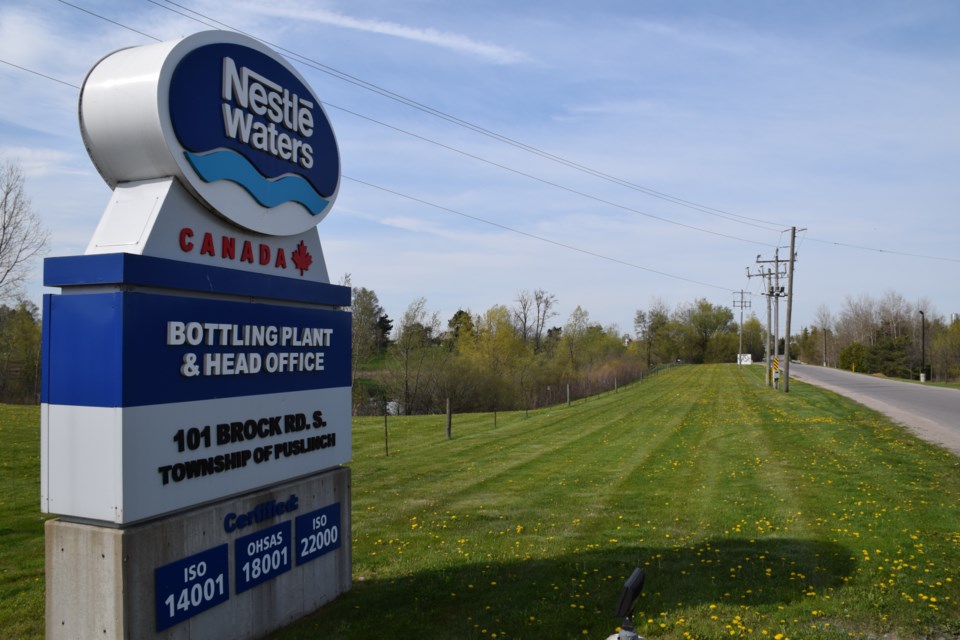In recent years, every time Nestlé Waters Canada seeks an extension of its permits to take water in the Guelph area, a wave of opposition ensues.
That is the case now as the company is looking for a 10-year extension on its permit to pump water for its water bottling plant in Aberfoyle, just south of Guelph along Highway 6.
The application to the Ontario Ministry of the Environment and Climate Change is not asking to increase the amount of water being pumped (currently up to 3.6 million litres each day), but to maintain the current pumping levels for an entire decade.
The application was made back on April 11, but the details of it are not yet posted on the MOECC Environmental Registry. Once posted, a 30-day public comment period will kick in.
Concurrently, but separately, Nestlé has applied for a two-year pump test on the former Middlebrook well in Elora, as part of an investigation by the company to measure the sustainability of the source. Nestlé has said that its plan would be to truck water from Elora to its bottling facility in Aberfoyle if Middlebrook is a go.
The company is facing increased opposition to both the Elora plan and to the Aberfoyle permit renewal. A broad-based community opposition has sprung up around the Middlebrook well proposal, with the group Save Our Water forming and working closely with water protection group Wellington Water Watchers. Middlebrook was the impetus, but the protection of groundwater throughout Centre Wellington and the Grand River watershed is the group’s goal.
Opponents of Nestlé will gather for a rally and march at the end of the month.
Environmental activist Amelia Meister has started an online petition to spur MOECC Ministry Glen Murray into rethinking the 10-year extension application. The petition can be found here.
The petition has already reached its goal, collecting just over 50,000 signatures as of Friday afternoon. Meister said in an interview that the goal is automatically increased once it is exceeded.
She explained that signers are coming from around the world, but what the Ontario ministry mostly takes into account is the level of concern in Ontario. So far, just over 24,150 of the petition’s signers are Ontario-based. Meister wants more local people to sign on.
Meister said that given the climatic uncertainties and volatilities related to climate change, a 10-year term for any water taking permit is too long. There have been extended periods of drought in the Guelph region in recent years, most recently in 2012, lasting several months. Nestlé should not be permitted to pump at high levels in the event of a recurring drought.
“We are in a time of climatic instability, where we can have prolonged droughts,” Meister said. “We don’t know what the weather will be like in the next ten years. It has proven to be fairly unstable in the last few years.”
Andreanne Simard, Natural Resource Manager at Nestlé Waters Canada, said Friday the monitoring technology used by the company at Aborfoyle enables it to use the resource in a responsible and sustainable manner.
Simard said the company is very mindful of climatic conditions, and adjusts its operation accordingly.
“Whether we ask for a 10-year or five-year permit, the monitoring data we collect allows for timely and adaptive management of the resource,” Simard said. “We are collecting a significant amount of data hourly, with over 80 points that we are monitoring off and on our property. We are committed to ensuring the long-term sustainability of the source and the ecosystem. We want the water to be here for future generations.”
She added that a 10-year permit is not out of the ordinary in the water-bottling industry.
“We view this as a reasonable request, and our data supports it,” Simard said.
In the event of a drought the company will adjust its pumping to ensure ecologically responsible practices, she indicated.
In line with the environmental stance of the Council of Canadians and Wellington Water Watchers, Meister is against the pumping and bottling of water for profit. She said Nestlé draws water for “a tiny amount of money” compared to what residents pay for tap water, and the company sells it for a “huge profit.”
“Water is a basic necessity of life that should not be profited from,” Meister added.
Meister said there is nothing to prove that Nestlé’s current pumping rates are viable over the long-term, and pumping during drought times could threaten accessibility to water for residents.
Simard said the demand for bottled water has increased. Canadians want to drink more water because it is a healthy thing to do. She said the company supplies it in a responsible manner.
“We are very fortunate to have a rich water supply here, and we can bring it to Canadians who demand a healthier option,” Simard said. “We are listening, and we understand the concerns. I have my own well. I live in Puslinch. I have a young family and I understand the concerns.”
The online petition garnered over 1,000 signers in the first hour, Meister added.
“I am not at all surprised,” she said. “People are passionate about water as a right, and they are passionately against Nestlé.”
Meister said she will leave the petition open until the end of the MOECC Environmental Registry comment period. Following that, she will present the petition to the MOECC minister.
At the end of the month, opponents of the selling of water for profit will take part in the Walk for Water. Walkers will gather for a brief rally at Market Square in Guelph at 2 p.m. Sunday, May 29, and proceed to the Nestlé Waters Canada plant in Aberfoyle. Another rally will be held in front of the Nestlé property at 5:30 p.m. The event is in support of Save Our Water’s "Water for Life, Not Profit” campaign.
